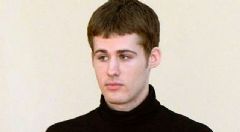Human Rights Voices
While the UN devotes its human rights operations to the demonization of the democratic state of Israel above all others and condemns the United States more often than the vast majority of non-democracies around the world, the voices of real victims around the world must be heard.
North Korea, September 14, 2014
Matthew Todd Miller Sentenced to 6 Years of Hard Labor in North Korea
Original source
The Supreme Court in North Korea on Sunday sentenced one of the three Americans known to be held in the country to six years of hard labor for committing "hostile acts" against the North. North Korea said the American, Matthew Todd Miller of Bakersfield, Calif., committed the crime while entering the country on a tourist visa in April, according to the official Korean Central News Agency.
The agency also carried photographs that showed Mr. Miller, who North Korean court records say is 25, in the defendant's seat in the courtroom with his eyes downcast, and flanked by uniformed security officials. The news agency gave no further details of the trial.
But The Associated Press and The Choson Sinbo, a pro-North Korean newspaper in Japan, both of which were allowed to attend the trial, said that Mr. Miller was convicted on spy charges under Article 64 of the country's criminal code.Mr. Miller was accused of entering North Korea with the "ambition" to deliberately violate North Korean law so he could experience life in a North Korean prison and later become a firsthand witness about the human rights conditions in the North, The Associated Press and The Choson Sinbo reported.
International attention to the North's human rights conditions has grown since a United Nations commission of inquiry issued a report in February documenting what it called "widespread, systematic and gross" violations, including enslavement, torture, rape and executions in the North's prison camps. The United Nations Human Rights Council adopted a resolution in March calling on the Security Council to take action.
The Choson Sinbo, quoting the North Korean court in its ruling on Mr. Miller, wrote, "His was an anti-state crime perpetrated under the protection and encouragement of the current U.S. government, which is intent on isolating and stifling our republic, and must be sternly punished."
North Korea had earlier accused Mr. Miller of unruly behavior, saying that he had torn up his visa at the Pyongyang airport and demanded asylum. In interviews with The Associated Press and CNN, which were conducted while North Korean officials were present, Mr. Miller said he apologized for his crime but did not discuss whether he had asked for asylum.
One of the two other Americans known to be held in North Korea, Kenneth Bae, a missionary, has been sentenced to 15 years of hard labor on charges of trying to build an underground proselytizing network in a plot to overthrow the North Korean government.
The other, Jeffrey Fowle, 56, is expected to go on trial soon, also on charges of committing hostile acts. Mr. Fowle, an Ohio municipal worker, entered North Korea in April on a tourist visa. He had said in an earlier interview with CNN that he was taken into custody because he had tried to leave the country after having left behind a Bible. North Korea treats proselytizing by outsiders as an attempt to undermine its government.
The United States has no diplomatic ties with North Korea and relies on the Swedish Embassy to represent the interests of Americans held in the reclusive country. Washington has repeatedly offered to send its envoy for North Korean human rights issues, Robert R. King, to Pyongyang, the North's capital, to gain the release of the three Americans, but North Korea did not agree to see him, apparently seeking bigger concessions from Washington, like a visit by a more prominent American.
The Choson Sinbo, quoting North Korean court records, reported on Sunday that Mr. Miller was born in California on Aug. 26, 1989, and visited South Korea before entering North Korea through China on April 10.
The newspaper said he had developed a deep hostility against North Korea while reading anti-North Korean publications.
During the trial, the prosecution presented as evidence Mr. Miller's iPad and iPod, his American passport, his torn-up North Korean tourist visa and his notebook.
While under interrogation, he asked to meet Mr. Bae and tried to mislead investigators by saying, untruthfully, that his iPod and iPad contained important data on American military bases in South Korea, The Choson Sinbo quoted the prosecution as saying.
Few outside analysts believed that Mr. Miller would have a fair trial with a proper legal defense. On Sunday, the court said that he had waived his right to hire a lawyer and that it would not permit an appeal.

